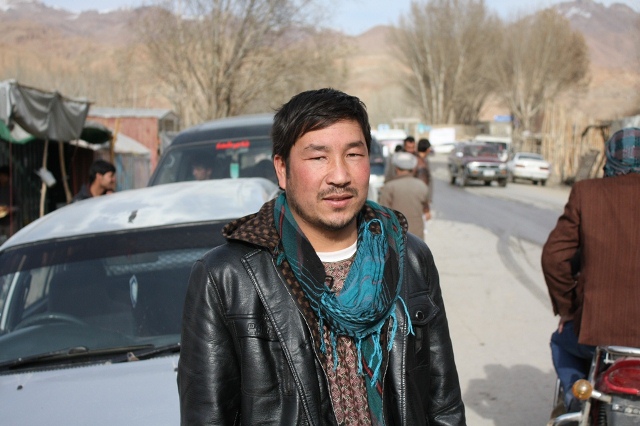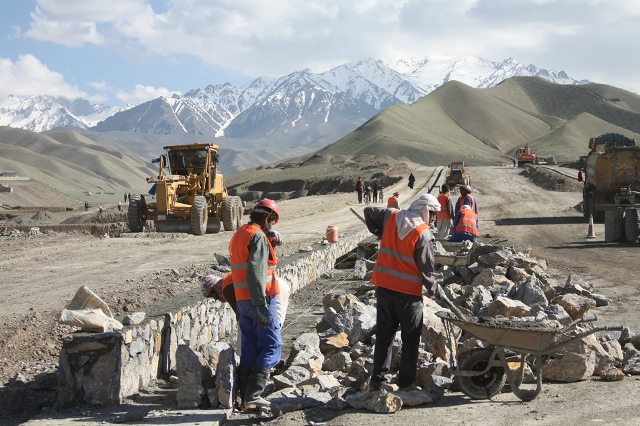KABUL - While the work of the United Nations in areas such as human rights and humanitarian affairs in Afghanistan is well-known, the activities of one of the world body’s agencies has drawn less attention but has made great inroads in helping the country’s development.“The work of UNOPS has made it easier for children to go to schools, for patients to go to hospitals, for farmers to transport their products to markets, and it is also good for security,” said the Afghan Deputy Minister for Public Works, Ahmed Shah Waheed, referring to the UN Office for Project Services, a UN agency responsible for assisting Afghan authorities in implementing a range of reconstruction and development projects – including the construction and rehabilitation of more than 10,000 kilometres of roads over the last decade.
“UNOPS Afghanistan has been managing some of the most critically needed infrastructure development works in the country in support of the Afghan Ministry of Public Works (MoPW) and the Ministry of Rural Rehabilitation and Development (MRRD),” said the UNOPS Regional Director for Asia, Europe, Middle East and Oceania, Bruce McCarron, during his recent visit to the country.
UNOPS is the operational arm of the UN. It helps a range of partners implement $1 billion worth of aid and development projects worldwide every year. “UNOPS’ mission is to expand the capacity of the UN system and its partners to implement peacebuilding, humanitarian and development operations that matter for people in need,” the agency states on its website
A number of donors have funded UNOPS’ work in Afghanistan, including the Governments of Japan, Italy, Australia, Sweden, the United Kingdom, Denmark, Norway and Lithuania. It has also received funding from the World Bank through its Afghanistan Reconstruction Trust Fund.
Its work has spanned across 33 out of Afghanistan’s 34 provinces – from road projects in the relatively peaceful Bamyan City and Foladi Valley in central Afghanistan, to the security-sensitive provinces of Kandahar, Helmand and Uruzgan in the country’s south.
A farmer and one of about 600,000 beneficiaries of a UNOPS-implemented road project in western Ghor province, Khan Mohammad, said the new asphalted roads have made life easier for him and other farmers when transporting agricultural goods to markets.
“As a farmer, I earn money through my harvest collection,” said Mr. Mohammad. “So prior this asphalt road I was losing more money to carry my harvest materials from my village to the city.”
Other local residents said the asphalted roads had an added health benefit.
“I walk to my school every day. Before this road was asphalted, our city was too dusty with bad pollution so I was getting different types of sickness and this disturbed my learning,” said a Grade 12 student, Ahmad Jawid.
UNOPS Afghanistan is currently supporting the MoPW in constructing a 136 kilometre two-lane paved road from Maidan Shar, the capital of Maidan Wardak province, west of the capital, Kabul, to Bamyan province in the country’s centre.
In Kabul – which has experienced a rapid increase in population and vehicles, leading in turn to problems such as traffic congestion, environmental pollution and traffic accidents – UNOPS is implementing the construction of a 15-kilometre stretch of road to the north of the airport, with financial support from the Government of Japan.
When possible, prior to implementing its projects, UNOPS conducts community consultations.
“By using a wealth of local knowledge when engaging with our stakeholders, from national authorities to local families, UNOPS creates infrastructure that is truly ‘owned’ by the people it serves, ensuring its long lasting sustainability,” said the Head of UNOPS Programme in Afghanistan, Paul Cruickshank.
Besides its road projects, the UN agency has constructed or rehabilitated 43 bridges and two schools. Currently, it is constructing one computer science facility in Kabul University, one hospital, two airports and 30 irrigation projects.
UNOPS is also working with other relevant stakeholders in implementing a range of other projects, including the safeguarding of cultural heritage, in collaboration with the UN Educational, Scientific and Cultural Organization (UNESCO), and partnering with the UN Environment Programme (UNEP) to protect the environment.
In 2011, UNOPS became the first UN organization to receive the ISO 9001 certification for its global quality management system. In August, it was awarded the ISO 14001 certification, recognizing the agency’s commitment to protecting the environment when managing construction sites.








